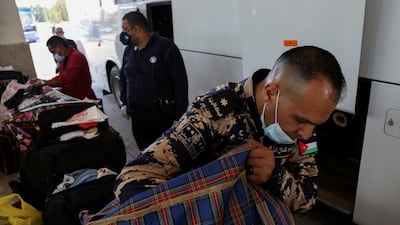When Amman normalised relations with Bashar Al Assad's government in Syria a year ago, Jordanian supermarket owner Abdulatif Saeed was hoping to restock everything from cheap Syrian detergents to mutton.
His shop in the dusty northern city of Mafraq, near the only open border crossing with Syria, sells mostly Jordanian and Saudi products, although Syrian goods costs less and have traditionally had a significant consumer base in Jordan.
“I only have Syrian walnuts,” he says. “Almost nothing else has been getting through.”
The meagre trade between Jordan and Syria reflects the overarching political problems marring a reconciliation with Damascus by the kingdom and other Arab countries as the war in Ukraine affects global powers involved in the Syrian conflict.
The last time Mr Saeed had ample Syrian stock was in 2011, the year of the revolt against five decades of Al Assad family rule. The regime used deadly force to suppress the pro-democracy protest movement and, by the end of the year, the revolt had militarised.
The Syrian regime was largely ostracised in the region for its violent response to the uprising, until Russia intervened to prop up the Alawite-dominated ruling elite in late 2015.
With prodding from Moscow, Jordan announced it was lifting restrictions on commercial exchange with Syrian regime areas in the last quarter of 2021 and resumed high-level contacts. These culminated in a phone call between King Abdullah II and Mr Al Assad in October last year.
Political price
Underpinning Jordan’s policy of accommodation has been hope in Amman that the Syrian regime would curb the flow of narcotics to Jordan, particularly the drug known as Captagon.
Jordanian officials say the Syrian military and pro-Iranian militias are the main players in the illegal drug trade. The narcotics reach their most lucrative market in Saudi Arabia through Jordan.
They had also expected to start exporting Jordanian electricity to Lebanon by March through Syrian areas controlled by regime forces.
The exports would have further eased the isolation of Mr Al Assad and restored some of his regional influence, especially given that Jordan had asked Washington to exempt the deal from US sanctions on the Syrian government.

A European diplomat said although the US wants to help Lebanon to obtain electricity, giving the Syrian president the leverage associated with the Jordan deal became less appealing after the Ukraine war brought Moscow and western countries to new levels of confrontation.
"Assad realised that the Jordanians are limited in what they can deliver," the diplomat said, highlighting accelerated Captagon smuggling this year from Syrian regime areas to Jordan.
Jordan, however, has remained a proponent of regional reintegration of the Damascus government, although shippers and business executives say bilateral trade bans have not been lifted.
Deifallah Abu Aqoula, head of the Jordanian Association of Owners of Clearance and Transport Companies, said bans include blanket prohibitions on the entry of goods from the two sides, high fees and other regulations stifling container transport.
"The bilateral trade is very weak. It is a lose-lose situation," he said.

Jordanian central bank data shows the country imported $33 million in goods from Syria in the first half of 2022, compared with $28m for the same period last year.
Jordan’s exports to Syria rose to $47m, from $39m in the first six months of 2021.
Although the figures are up, they remain a fraction of the $1.2 billion of Jordanian exports to Arab countries and the $2.8bn of imports from Arab countries for the first half of this year.
Alternative route
A manager at a chocolate shop in Amman, who did not want to be identified, said a few shipments of Damascene rose and pistachio chocolate made it by service taxi across the border from Syria in October last year.
The respite was brief before Jordanian customs officials again stopped the shipments from entering, forcing him to resume importing the same chocolate by plane through Beirut. The additional shipping costs raised the chocolate price by 25 per cent to $35 a kilo.
“It is a shame because the chocolate factory is in southern Syria, literally across the border from Jordan,” he says.
The collapse of the Syrian pound over the past decade and continuation of agriculture and some industries have made certain Syrian goods extremely cheap when paying with the Jordanian dinar, which is pegged at $1.40 to the dollar.
The Syrian currency is trading at 5,000 Syrian pounds to the dollar, compared with 50 pounds to the dollar in 2011.
For example, a kilo of pomegranates is 30 cents in Syria and a kilo of lamb is $4.50 — much less than their Jordanian equivalent.
Vanishing opportunities
So when the Jordanian and Syrian governments announced in September last year that the border had fully reopened, Jordanian taxi driver Imad Bashabsheh expected to resume his daily trips across the border, making him more money.
Jordanian solar panels, which he can carry across the border in his large American SUV, were in high demand because of power shortages in Syria.
But the Jordanian authorities have kept regulations that allow Mr Bashabsheh and the other 2,000 Jordanian taxis registered on the Syria frontier to cross the border and back only once every five days.
He says in the few times he brought over Syrian merchandise in the past year, Jordanian customs officials mostly destroyed it.
“It is not worth it,” says Mr Bashabsheh, who switched last month to operating on the Jordan-Saudi Arabia route.


